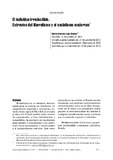El individuo irreductible. Extravíos del liberalismo y el socialismo modernos
The Implacable Individual. Deviation of Modern Liberalism and Socialism
Compartir este ítem
Fecha
2016-06-30Autor
López Bolívar, María Cristina
Citación
Metadatos
Mostrar el registro completo del ítemDocumentos PDF
Resumen
El individuo es un elemento determinante para la historia de Occidente. Su surgimiento responde a fenómenos sociales de los siglos XVIII y XIX; la creación y crisis del Estado-nación como modelo de organización, si bien individualista y competitiva, ha mostrado ser insuficiente para atender y comprender a los individuos como particulares e irreductibles a la jurisprudencia colectiva. Esta crisis repercute en las críticas al Estado-nación realizadas por posturas acérrimamente individualistas como la de Max Stirner, autor de El único y su propiedad, quien planteó la irreductibilidad del hombre a cualquier manifestación social y teórica que se pretenda superior al individuo. The individual is a decisive element for the Western history. Its emergence responds to social phenomena of the 18th and 19th centuries; the creation and crisis of the State-Nation as an organization model, despite its individualist and competitive nature, has proven to be insufficient to assist and compromise the individuals as particular and implacable parties of collective jurisprudence. This crisis has an impact on the criticism to the State-Nation made with extremely individual opinions such as that of Max Stirner, the author of “El Unico y su Propiedad,” who spoke about the implacable nature of man before any social and theoretical manifestation alleged as superior to the individual.


